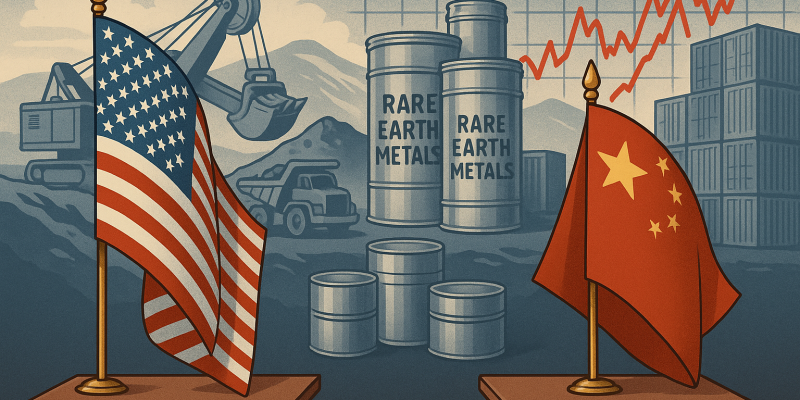
Shares of US-listed rare earth mining companies fell sharply on Monday after officials in Washington indicated that China would likely delay implementing export controls on critical minerals.
The news comes as part of ongoing negotiations between the two countries aimed at finalizing a broader trade deal and easing escalating tensions over tariffs and technology restrictions.
Market reaction: rare earth miners drop
Several US-based rare earth and critical mineral producers saw their shares decline in early trading following the announcement.
Critical Metals plunged 9.8% in premarket trade, while USA Rare Earth dropped 7.8%.
MP Materials, one of the leading producers of rare earth elements in the United States, lost 5.3%, and Trilogy Metals declined by 6.3%.
Energy Fuels and NioCorp Developments also traded lower, falling 4% and 7%, respectively.
The sell-off reflected investor disappointment that potential US policy moves to counter China’s dominance in the critical minerals sector might be postponed.
China remains the global leader in rare earth production and processing, giving it significant leverage over the supply chain for materials vital to modern technologies, including electric vehicles, wind turbines, and defense systems.
Washington and Beijing seek trade compromise
US Treasury Secretary Scott Bessent said during an interview on NBC News’ “Meet The Press” on Sunday that Washington and Beijing were nearing an agreement that would prevent the imposition of a new 100% US tariff on Chinese goods.
As part of that deal, China is expected to defer its planned export controls on rare earth minerals.
The development comes just days before a high-profile meeting between Chinese President Xi Jinping and US President Donald Trump, scheduled for Thursday.
President Trump, speaking to reporters aboard Air Force One while traveling to Japan, said he believed the two nations were poised to “come away with” a trade deal.
“I have a lot of respect for President Xi,” Trump added, signaling optimism about the talks.
The US administration had previously threatened to impose tariffs of 100% on imports from China starting November 1, while also warning of potential export controls on what it described as “any and all critical software.”
Those measures were widely viewed as a means of pressuring Beijing to make concessions on technology transfer and market access.
China’s role in the global supply chain
Earlier this month, China introduced a new framework for restricting rare earth exports, a move that analysts interpreted as a warning to the West and a reflection of the deepening mistrust between the world’s two largest economies.
Despite that, recent developments suggest that Beijing may delay the actual enforcement of these controls as part of a temporary truce with Washington.
“Details are still limited, and nothing will be finalized until the Trump-Xi meeting,” Wolfe Research analyst Tobin Marcus said in a note to clients on October 26.
“But a renewed truce now seems near-certain, with China likely fully delaying their rare earth export controls for a year—better than the alternative of an agreement to grant licenses.”
China currently dominates the global rare earth market, accounting for roughly 70% of global production and nearly 90% of processing capacity.
While the delay in export restrictions may provide short-term relief for US manufacturers reliant on these materials, it also highlights the strategic vulnerabilities in America’s supply chain for critical minerals.
The post US rare earth stocks slide as China expected to delay export controls appeared first on Invezz








